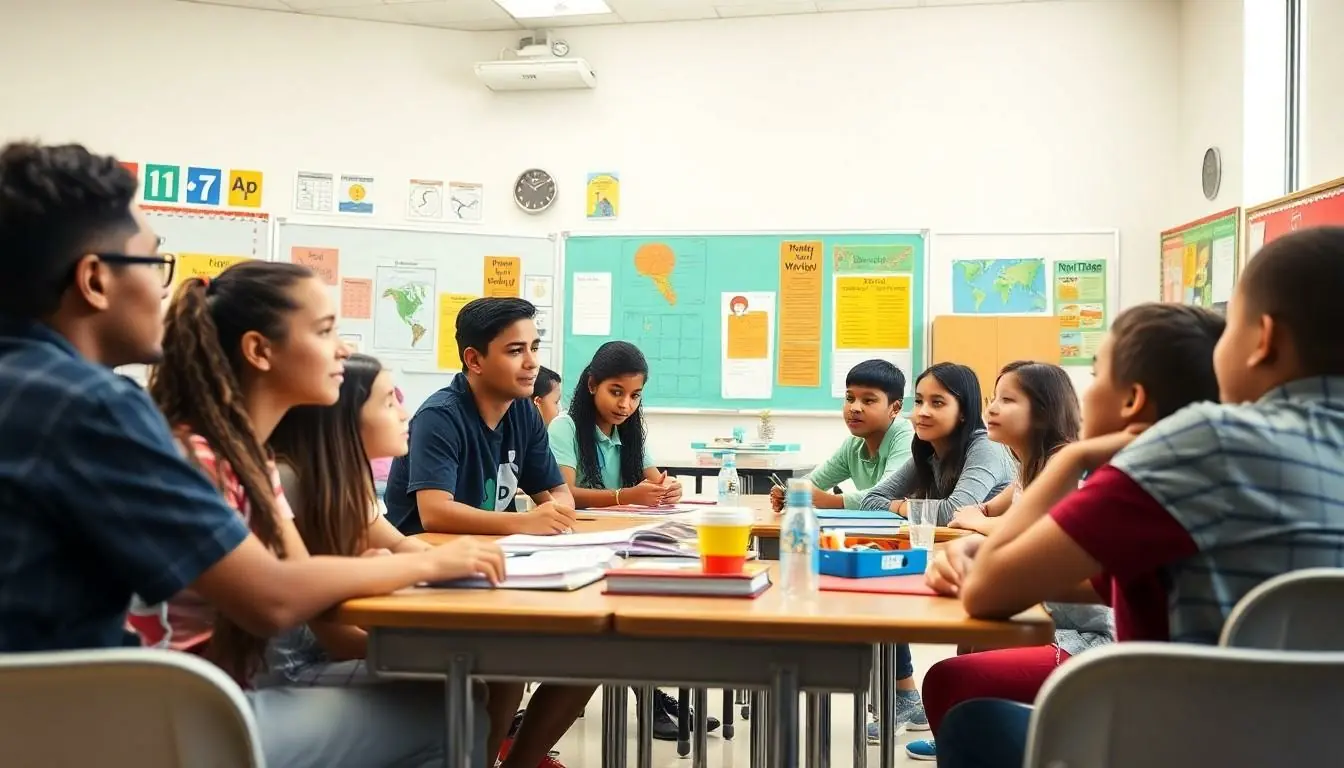Table of Contents
ToggleWhen it comes to education, Florida’s K-12 system is like a roller coaster ride—thrilling, full of ups and downs, and occasionally leaves you questioning your life choices. With sunshine and theme parks around every corner, it’s easy to overlook how the state stacks up in terms of academic achievement. But don’t be fooled by the palm trees; Florida’s education ranking has a story worth telling.
Overview of Florida K-12 Education Ranking
Florida’s K-12 education system ranks among the top states in the nation. According to the National Assessment of Educational Progress (NAEP), Florida students demonstrate strong performance in subjects like mathematics and reading. In 2023, the state ranked third overall in fourth-grade math scores, an achievement reflecting its commitment to educational standards.
Academic achievement varies across districts. Certain counties, such as Seminole and Sarasota, consistently outperform others in standardized assessment scores. A report by Education Week highlights Florida’s focus on educational equity, though disparities remain evident among different demographic groups.
Funding also plays a critical role in Florida’s K-12 education landscape. The state invests approximately $13,000 per student, which ranks moderately when compared to other states. Enhanced funding programs target underperforming schools, aiming to improve student outcomes in historically disadvantaged areas.
Innovative initiatives further contribute to Florida’s educational success. Programs that emphasize school choice, such as charter schools and voucher systems, offer families a variety of educational pathways. These initiatives have garnered national attention, with numerous states looking to Florida as a model for their own education systems.
Data from the U.S. Department of Education shows that nearly 60% of Florida high school students graduate on time. This figure represents significant progress over the past decade. Improvement strategies focus on early literacy and support for struggling students, aiming to elevate the overall graduation rate.
Florida’s K-12 education ranking stands as a testament to the state’s efforts, showcasing both the accomplishments and challenges within its diverse educational framework.
Factors Influencing Education Rankings

Several factors contribute to the overall ranking of Florida’s K-12 education system. Understanding these elements sheds light on the strengths and challenges faced by the state’s educational framework.
Student Performance Metrics
Student performance metrics play a vital role in determining education rankings. Math and reading scores significantly influence assessments, with Florida ranking third in fourth-grade math based on the 2023 NAEP results. Graduation rates also matter, showcasing nearly 60% of high school students finishing on time. Disparities exist among districts, with top-performing counties like Seminole and Sarasota often highlighting differences in educational achievement. Recognizing these metrics helps stakeholders understand specific areas for improvement and celebrate successes within the state’s diverse student population.
School Funding and Resources
Funding and resources directly impact educational quality in Florida’s K-12 system. The state invests approximately $13,000 per student, which supports various programs and initiatives targeting underperforming schools. Increased funding enables schools to offer specialized resources and innovative teaching methods. School choice options further enhance educational opportunities, allowing families to select the best fit for their children. The connection between adequate funding and improved academic outcomes remains clear, emphasizing the need for continued investment in Florida’s educational infrastructure.
Comparison with Other States
Florida’s K-12 education ranking reflects its competitive position among other states. Analyzing the national education rankings reveals that Florida frequently places in the top tier. In the 2023 NAEP results, the state secured third place in fourth-grade math scores, highlighting substantial student achievement. Educational equity remains a focal point, though disparities exist in performance among different demographic groups.
National Education Rankings
Nationally, Florida ranks among the top five states for overall K-12 education quality. Strong performances in standardized tests support this position, especially in math and reading. States like Massachusetts and New Jersey often surpass Florida, particularly in overall funding and educational resources. The commitment to improving literacy and graduation rates strengthens Florida’s efforts to maintain its competitive edge.
Regional Insights
In the Southeast region, Florida stands out, outperforming neighboring states such as Georgia and Alabama in various educational metrics. High-performing districts like Seminole County serve as benchmarks, illustrating effective strategies for student success. Sarasota County reflects similar strengths, showcasing innovative programs that contribute to high graduation rates. Regional comparisons further emphasize Florida’s diverse educational landscape, indicating both successes and areas for improvement.
Strengths of Florida’s K-12 Education System
Florida’s K-12 education system showcases several strengths that contribute to its high ranking among states. These strengths include impressive academic achievements and innovative programs aimed at fostering educational success.
Academic Achievements
Academic achievements in Florida demonstrate consistent improvements across various subjects. For instance, in the 2023 NAEP results, Florida ranked third for fourth-grade math, with increased emphasis on literacy efforts contributing to this success. Performance metrics vary by district; however, top-performing areas like Seminole and Sarasota consistently achieve higher scores. Approximately 60% of high school students graduate on time, reflecting ongoing progress and dedication to improving education in the state. Such accomplishments highlight Florida’s commitment to educational standards and outcomes.
Innovative Programs
Innovative programs play a crucial role in enhancing Florida’s K-12 educational landscape. The state implemented school choice options, allowing parents and students more flexibility in selecting educational pathways. Additional funding of around $13,000 per student supports enhanced resources and specialized programs for underperforming schools. Initiatives aimed at improving early literacy and supporting struggling students further illustrate the state’s commitment to innovation. Programs designed to address equity among diverse demographic groups also contribute positively to overall educational performance. These efforts establish Florida as a leader in educational innovation and improvement.
Challenges Faced by Florida’s K-12 Education System
Florida’s K-12 education system encounters several challenges that impede its potential.
Equity and Access Issues
Disparities in access to quality education persist among demographic groups. Low-income and minority students often face significant hurdles in securing the same resources as their peers. While the state invests approximately $13,000 per student, funding allocation frequently varies by district, affecting the level of support available. Students in underperforming schools particularly struggle with inadequate facilities and limited access to advanced coursework. As a result, educational equity remains a crucial concern for policymakers aiming to bridge the achievement gap. Enhanced support programs target these disparities, yet substantial challenges remain in ensuring all students receive a quality education regardless of their background.
Teacher Retention and Support
Teacher retention poses a significant challenge in Florida’s K-12 system. High turnover rates diminish classroom stability and continuity for students. Inadequate support and compensation often lead educators to seek opportunities in other states or industries. Challenges in recruiting qualified teachers exacerbate the issue, particularly in high-need subjects like math, science, and special education. Retaining skilled educators requires ongoing professional development and competitive salaries. Efforts to improve working conditions and offer incentives may bolster retention rates. Addressing these concerns is vital for maintaining educational quality and supporting student achievement across the state.
Florida’s K-12 education system stands out for its impressive achievements and ongoing challenges. The state’s commitment to improving student outcomes is evident in its strong rankings in subjects like math and reading. However disparities among districts and demographic groups reveal the need for continued focus on equity and support.
Investments in education and innovative programs are crucial for addressing these challenges. By prioritizing teacher retention and equitable access to resources Florida can enhance its educational landscape. As the state continues to evolve its approach to K-12 education it holds the potential to serve as a model for others while ensuring every student has the opportunity to succeed.




